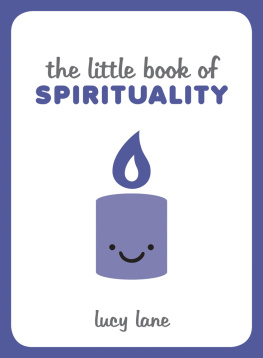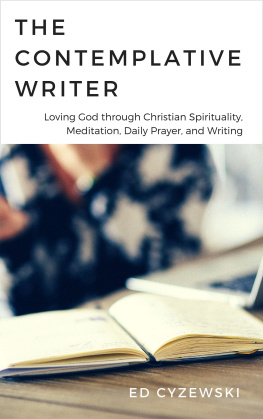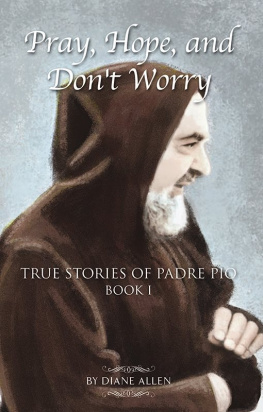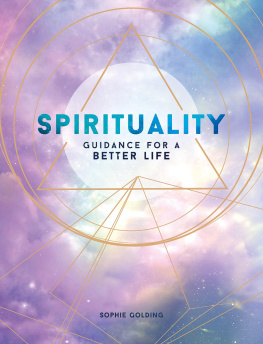We in the church have been too quick and too comfortable drawing lines between the sacred and secular, between the holy and profane. In this gem of a book, James Hazelwood invites us to blur those lines and to see all of life as a spiritual practice, a sacred journey, holy ground. This book will refresh your perspective on your daily work, your relationships, yourself, and your world.
The Rev. Keith Anderson ,
author of The Digital Cathedral: Networked Ministry in a Wireless World, and pastor of Upper Dublin Lutheran Church in Ambler, Pennsylvania


EVERYDAY SPIRITUALITY
Discover a Life of Hope, Peace and Meaning
Copyright 2019 by James Hazelwood. All rights reserved.
No part of this publication may be reproduced, distributed or transmitted in any form or by any means, including photocopying, recording, or other electronic or mechanical methods, without the prior written permission of the publisher, except in the case of brief quotations embodied in critical reviews and certain other noncommercial uses permitted by copyright law.
Although the author and publisher have made every effort to ensure that the information in this book was correct at press time, the author and publisher do not assume and hereby disclaim any liability to any party for any loss, damage, or disruption caused by errors or omissions, whether such errors or omissions result from negligence, accident, or any other cause.
Adherence to all applicable laws and regulations, including international, federal, state and local governing professional licensing, business practices, advertising, and all other aspects of doing business in the U.S., Canada or any other jurisdiction is the sole responsibility of the reader and consumer.
Neither the author nor the publisher assumes any responsibility or liability whatsoever on behalf of the consumer or reader of this material. Any perceived slight of any individual or organization is purely unintentional.
The resources in this book are provided for informational purposes only and should not be used to replace the specialized training and professional judgment of a health care or mental health care professional.
Neither the author nor the publisher can be held responsible for the use of the information provided within this book. Please always consult a trained professional before making any decision regarding treatment of yourself or others.
Unless otherwise noted, all Scripture quotations are from the New Revised Standard Version, Anglicized Edition. Copyright 1989, 1995 by the Division of Christian Education of the National Council of the Churches of Christ in the U.S.A.
Scripture quotations marked The Message are taken from The Message. Copyright by Eugene H. Peterson, 1993, 1994, 1995, 1996, 2000, 2001, 2002, NavPress Publishing Group.
ISBN: 978-1-7333886-0-3
Credits
| Copy editors: | Brenda Quinn.
|
| Design, art direction, and production: | Melissa Farr, Back Porch Creative,
info@backporchcreative.com |
Cover illustration istockphoto.com.
Dedication
For Lisa
Preface

We have a long history in western culture of dividing the secular and the sacred into two separate, distinct categories. That divide has its origin in something called dualism, which most likely started with the Greeks. But, before the Greeks divided the world, the Hebrew people had a much more integrated way of understanding life, which is that all creation is bathed in the sacred. This book is an attempt to reclaim that way of thinking, which, by the way, is found in many other cultures, traditions, and religions around the world. Im also making the case that this integrated or holistic approach is at the heart of Christianity too; we just drifted away from it.
An early reader of this book commented, Its a Christian book, but its more than that. I think what they were trying to say is that while this book is rooted in my faith as a progressive Lutheran Christian, its a broad and open expression of the movement of Jesus. If your image of Christianity comes from TV news, politicians, or myopic social media news feeds, you might think that the religion of Jesus is full of rightwing politics, harsh judgementalism, and anti-LGBTQ+ attitudes. This book shows the other side: Hope, Love, Joy, Grace, Peace, yet honest real-life struggles and hurts, all together in a faith that is both honest and beautiful. I hope that after you read this book, youll pass it on to someone who is not very religious, and theyll begin to see another way.
The book has twenty-seven short chapters divided into three sections. Each chapter probes an action that we regularly do as part of our everyday living or, as the section titles suggest, every day, every week or every so often. Each chapter is its own story, so you can read the chapters in any order. My hope is that each one will help you view your regular, ordinary, everyday life as spiritual.
Free Bonus Resource Guide for
Everyday Spirituality

Visit www.JamesHazelwood.net to sign up for resources, a group study guide, ideas and stories of how ordinary people are living out Everyday Spirituality.
When you do Ill give you a link to the Resource Guide for this book.
While you are there, send me a note, and let me know about your own Everyday Spirituality.
Introduction

Like most people, Ive always had this tugging sensation that there is something more significant, broader, deeper, more expansive and timeless about life than just the day-to-day tasks of doing the dishes, mowing the lawn and walking to the grocery store. Some people call it God; others call it the universe; still others refer to it using a variety of mystery-based descriptive words. All these descriptions are inadequate, but they are our best attempts at illustrating an ultimate reality beyond the day-to-day. Somehow, I never found a way to connect, understand or nourish a relationship with that ultimate sacred reality. For the sake of ease, Im calling that God.
I tried devotional books, explored meditation, downloaded prayer guides, and even dabbled with various apps. All these and many other tools were fine; some worked for a while, and a few I still practice. But something was still missing. All these tools seemed to relegate God or the quest for God to a spirituality that was separate from my daily life.
For almost six decades, I have struggled with and felt guilty about not being spiritual enough. As a pastor, I spoke with many people who longed for a spiritual practice. It was my job to advise them, coach them, and nourish their spirituality. I made suggestions, asked questions, and even preached sermons. I felt adrift. This all reminds me of the adage I heard years ago, We teach best what we most need to learn.
Then in 2017, while attending a talk by the author Rob Bell, I heard something that made me realize there is a different path. During a Q & A session before Robs speech in Boston, Massachusetts, a young college student asked him what kind of spiritual practices he uses. After a long pause, he said, You mean like, surfing. There was laughter in the audience of earnest seekers who had come to hear from this former pastor and now quasi-guru. While many laughed, I realized he was serious. I also realized that I have many spiritual practices that dont fall into the traditional categories. I swim, cycle, and hike. I also read, write, and speak. My mind exploded with all the things I do in life that are indeed very much spiritual. This led me to a reexamination of spirituality what it is, the times we relegate it to the corners of our life, and other times when it becomes all about all of life.









